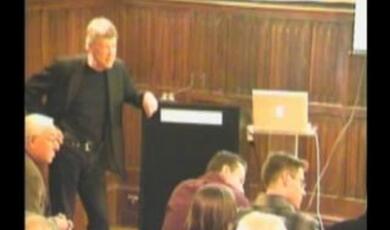02 December 2010
Who am I?
Some answers from classical Hindu thought
Emotions and Questions of the Self
Dr Irina Kuznetsova
In this talk I am going to look at emotion, the topic which is surprisingly often overlooked in contemporary debates on the self. In the past forty or so years there has been an explosion of interest in emotion in philosophy, psychology, developmental psychology, psychiatry and neurobiology, and emotion now constitutes a distinct research area with a great scope for cross-disciplinary collaboration. So in this talk I want to consider what the leading contemporary theories of emotion can contribute to the philosophy of self and consciousness, and also to the classical Indian debate on the existence and nature of self which we are focusing on today.
How often do you get emotional? I ask, because a common misconception is to think of our mental life as punctuated only periodically by emotion, but otherwise non-emotional or emotionally neutral for considerable stretches of time. This description refers to emotional episodes, which is only one, but the most readily recognisable part of the much wider phenomenon of emotion. Emotional episodes, sometimes also referred to as emotional states, such as getting angry at someone's comment, indeed have a discernible onset, building up and dissipation, and last a relatively short time, usually measured in minutes. But that does not mean that the rest of our time is spent in an affectively neutral state. All our mental life is permeated by a subtler form of affectivity termed core affect that provides the emotional quality to any conscious state. And we remember, of course, that what defines consciousness or first-personal experience is how it feels from the inside to the subject of this experience; there is something it is like to be in a conscious state, so consciousness is indissociable from feeling. As we shall see in the course of this talk, an examination of emotions, especially from neurobiological perspective, has a lot to say about how this feeling is generated.
Core affect colours our entire mental stream in the form of simple, primitive feeling, which merits similarly paired down descriptions like feeling good or bad, energised or enervated, tense or calm. The attention we usually give to core affect is peripheral, which explains the use of the alternative term - background emotions. In moments of, say, concentrating on solving a mathematical problem, these emotions may be so peripheral in our consciousness as to be almost transparent, but they are never fully transparent, which accounts for why our experience always has some particular feel, even if so subtle as to be indescribable. Since in emotion we basically feel the stress of our mind and body continuously adapting to the changing situation, the mildness of emotion signals that you are finding it easy to adapt to the current situation.
The important thing to note is that affect is embedded in all experience, it blends in with and colours all other discernible mental processes and events, such as deliberation, decision making, desires and motivations, remembering, the type and style of ideation and so on. It functions as a unifying factor, a common prism for the evaluation of otherwise disparate events. What memories and plans pop into mind, how we judge the level of threat and our chances of success, what we pay attention to, the general style and pace of our thinking and myriad other mental operations are guided and shaped by emotion.
The influence exerted on our mental life by emotion becomes less surprising when we come to appreciate that the scope of emotion is much larger in terms of both depth and extension than we commonly realise. We have already talked about extension - there is nothing in our mind that is not affectively coloured; everything we do mentally we do through emotion, although for periods of time, for instance when we manage to maintain razor-sharp focus on intellectual work, this emotional frame stands at the periphery of our attention. Later in this talk we shall see that the great subconscious underlying our conscious existence is also constituted by emotional processing. No need to be too hard on ourselves then when we struggle to shake off an emotion or to reason ourselves out of a particular emotion, because emotion is in fact a much deeper phenomenon and would run through the very reasoning with which we are trying to overturn it. It has now been proven with experimental evidence that emotional state has a direct influence on cognitive performance: an uplifted mood increases creativity and enables one to see and consider more options, while we all know how in a depressed mood the world and its possibilities seem to close in on us.
What is important to highlight and what will become clear in the course of this talk, particularly when we consider the role emotions play in constituting the preconscious basis of our conscious mental life, is that emotions are far from being an add-on, let alone a disposable add-on, to conscious life; they are constitutive of consciousness on all levels and play a very important role, which means that findings on emotions should be given substantial weight in philosophy of self and mind.
This is something that philosophy came to appreciate only recently. For a subject of such obvious philosophical interest as emotions, we may be surprised to find that historically, until the boom in the study of emotion in the 1970-s, philosophical theories of emotions came few and far between. It is not that emotions were entirely neglected, but their treatment was most often embedded within a larger, usually ethical, philosophical agenda. Few philosophers set themselves the task to define the nature of emotion per se. One of the reasons why emotion had not enjoyed as much focused philosophical attention as it deserved until recently was a persistently assumed dichotomy between emotion and reason, with reason granted rarely disputed superiority over emotion - as we have seen both these assumptions are, of course, inaccurate.
This meant, however, that on the one hand, emotion did not readily suggest itself as a subject of rational philosophical enquiry, or alternatively, that it was viewed as an irrational, even dangerous, aspect of our nature that must be controlled by reason. Curiously enough, when emotions did come into the philosophical spotlight in the last quarter of the 20th century, it is the cognitive theory of emotions as judgements that gradually became the widely accepted and dominant view. This theory traces its origins back to the philosophy of emotion developed by the Stoics, whose analysis of emotions viewed as misguided judgements conducive to misery, was motivated by the practical concern with control of emotion. It is only in the evaluative framework of our wants, values, interests and goals that we form our affective appraisals, and by reconfiguring this framework we can redefine our appraisals and thus control our emotions - this involves both pre-emptive work and continuous monitoring, analysis and reassessment of judgements embedded in every affective response.
This promise of control, of being in charge of our emotions is clearly a great part of the Stoic theory's appeal, with neo-Stoics like Robert Solomon famously defending the thesis that our emotions are our choice in the appropriately titled book Not Passion's Slave: Emotions and Choice(Oxford, New York: Oxford University Press 2003). Having redefined the ultimate goal of the Stoic programme from eradication of emotions toeducation of emotions, Neo-Stoic theories of emotions, like those of Martha Nussbaum, Robert Solomon and Richard Sorabji, embrace and develop, however, its main theoretical premise that emotions are evaluative judgements which predicate their object with salience, urgency, or importance.
This last point captures something very important about emotions, which is also supported by the findings of neurobiology. One of the functions of emotion is to highlight and to keep our attention on what is important to our self. Our brain continuously generates what neurobiologist Antonio Damasio whose work will play an important role in this talk terms 'images'. The brain is keeping a running record of everything in its environment as well as of the internal states of the organism, forming images on every topic, in every modality and of every affective flavour. For example, when we were all standing outside having drinks, while you are following the conversation with just the person or people you are talking to, your brain is following and keeping records of everything within your earshot, as well as visual records of both things you actively see and things you don't even realise you have seen until, given the opportunity, you recognise them on a later occasion; your brain is also keeping records of all your internal states, such as the pain in your knee, even if you are not paying attention to it at the time.
However, only so many images can be active and attended to at any given time, moreover these images need to form some sort of coherent narrative, and only so many images can be stored in memory - all this is achieved through selection, and emotion plays a very important part in this process, as it determines which out of the myriad images competing for attention should be granted attention.
For example, fear puts you in an extremely focused mental state: your thinking will be quick, not working out all the details of the situation, but just giving you quick actionable solutions; you will not notice anything in the environment that is irrelevant to your fighting or escape and you will not be distracted by internal states such as pain in your knee or your hunger either. Your emotion guides the selection of only the images that based on previous experience are evaluated as helpful or relevant in this type of emotional situation from the myriad online images and memory records.
Returning to the earlier example of listening to just one conversation, but technically hearing other conversations as well - suddenly some words from the conversation of the other group standing beside you will jump out at you and grab your attention away from the conversation you are having. Why would a thing like that happen? It is because in that conversation of which passive record was being kept an emotionally charged word, a word with emotional highlighting came up: it could be the name of someone important to you, most obviously your own name, or it could be, for instance, a term you have been really struggling with in your work recently.
Our emotions are taking care of and promoting the wellbeing and interests of our self, both the biological self and also the moral or narrative self we have developed and taught ourselves to be.
There is a small range of emotions that are hard-wired in us - they are there to secure our biological survival and life management needs. But what makes us different from even higher animals is that in addition to the core self consisting in basic reflexivity or self-awareness, we also have a highly developed extended or narrative self, which allows us to educate and to some extent change the whole edifice of our consciousness from top down, using the plasticity of our neural system. Thus to stick with computer metaphor, we can overwrite the hard-wired tracks of our emotions with new, sometimes consciously developed software. This can be done on the level of society, a particular group or even just by an individual himself or herself. Emotions are the medium that allows us to educate our subconscious self. There is a continuous cycle: deep down on the subconscious level it starts with emotion - something triggers it - that something is an image which can be an image of something external, for instance a visual perception, or an image of something internal, for instance a memory. What types of images become emotional triggers is determined by our previous experience - the image has to be relevant to us (although not necessarily to our conscious self), it has to join up with the micro and macro narrative of our self. To give a very simplified account, the flaring up of emotion in the brain in response to a trigger-image then starts the chain reaction of bodily changes, the feedback from which comes back to the brain where it kicks off more conscious processing - conscious mental work then continues in line with the emotion, selecting images that are in accordance with it from the ones collected online through the sense organs and also from the entire depository of images stored in memory, until in that process an image becomes active that triggers a change of emotion, and the whole current of selection of images is then redirected into a slightly or significantly different route. Because all emotions are self-centred, however, there is overall coherence - despite fluctuations and variations, everything in the current is relevant to the self.
This machinery is larger than any one thought or belief we have, but overall and over time we can, so to speak, reason with it. Remember that I said that we can have an emotional reaction to an image representing something outside, but equally to an image representing something inside, our own thought for example. However, to make something like a thought, or anything we learn, or any belief we want to cultivate effective is again to connect it with emotion. Examples are very easy to come by - compare how well a person is able to learn a subject and how long to retain that knowledge for when they are genuinely interested in that subject and see it fit in somehow with their self-perception, as opposed to when they are learning that subject simply because someone made them do it or they just need to pass a test, but see no use or relevance of the information to themselves personally. Emotion is a natural marker of relevance to self, with the intensity of emotion proportionate to importance to self, and this natural mechanism can be channelled for education purposes. This is known and used, although still insufficiently, in pedagogy, and it is also used in religion. The ideal learning situation is when presentation of new information is embedded in an experience, which makes the learner personally engage with and connect with the new material. As we know the mother of learning is repetition, and it is best that all rehearsal is also accompanied by emotional reinforcement. The purpose of initiation and other rituals in religion is exactly that - to put a person into a heightened state of emotion, which should facilitate internalising and reinforcement of religious ideas. Symbolic objects both in religious and in lay life are used as anchors - they are first introduced in an emotionally charged situation and with some rehearsal should anchor and serve for quick retrieval of the emotion and the meaning connected with it; an example here is a wedding ring.
I think the Buddhist sequence of samatha or calm concentration meditation and then vipassana or contemplation meditation is another example of educating emotions using emotional mechanisms. The calm abiding meditation as the name suggests puts the mind into a calm, receptive state, which is also mildly pleasant; most distractions having been cleared away, it affords ideal conditions for focussing on and rehearsing the ideas one wants to implant in one's psyche. An example of one such idea used in Buddhist contemplation would be the transfer of the love one has for one's mother to other living beings. Notice how the whole pathway here is emotionally encoded.
But given that emotions are, as we have so far established, self-centred,can they be used to cultivate no-self? Yes they can! On the narrative or extended consciousness level we can develop any kind of idea of self we like, including no-self, and then use the emotional feedback loop to sink these ideas of self into our subconscious. Cultivating this will not be easy and descriptions of the Buddhist path do not pretend that it is, but in various degrees it is possible. For examples of success in reprogramming the self in ways that go against nature, but are ethically valuable, we do not need to look to Buddhism.
From my school history lessons on World War Two I remember one Russian soldier called Alexander Matrosov, and there were many others like him. He threw himself onto the enemy pillbox, blocking the machine gun with his own chest to stop it from firing at his comrades and allow them to make an important advance. How can we say that we are always guided by self-preserving emotions in the face of an act like that? In that act Alexander Matrosov was still preserving his self, but not his biological self - he has successfully managed to cultivate through emotional practice the image of his self as the courageous man who would give all for his country and comrades, and in the critical, emotionally charged situation he acted to preserve this self of his, rather than the biological self. A Bodhisattva will do the same. But this of course goes against the traditional Buddhist account of things, which would favour them beingexactly the other way around: rather than saying that Buddhist no-self is constructed on the extended or narrative consciousness level using deeper self mechanisms, they want to say that self is constructed on the extended consciousness level out what on a deeper level is in fact no self.
Neurophysiological research on emotion as presented, for example, by neurobiologist Antonio Damasio in his seminal work The Feeling of What Happens: Body, Emotion and the Making of Consciousness (London: Vintage 2000) mitigates against any strong no-ownership or anonymity claim (I owe this term to Dan Zahavi) and against reduction of self to a sequence of momentary self-contained cognitive events. What is particularly important is that it finds unity, continuity and self-centredness of processing below the waterline of reflexive awareness, on the preconscious level of emotional processing termed by Damasio the proto-self.
Out of the many cases studied by Damasio and other neurobiologists I have time to highlight only one, that of David who as a result of brain damage caused by severe encephalitis has a memory span of only forty-five seconds in which he can learn and remember new facts. If he is introduced to a new person who then leaves the room and returns within twenty seconds, he would be able to recognise this person and recount how the latter walked out of the room and came back, but if this person came back in two minutes, David would have no recollection of him at all. Despite this devastating memory and learning impairment, David displays what can be described as emotional memory which enables subconscious learning. In an experiment David was given equal timed exposure to engagement with a bad guy, a good guy and a neutral guy, where goodness was specifically emotionally encoded (the bad guy was in fact an attractive young woman to offset David's manifest preference for female company, and her badness consisted in giving David boring, emotionally unrewarding tasks and being stand-offish with him). Several days after the exposure David was asked to look at the photographs of the three people who took part in the experiment and a fourth, random person (and we have to keep in mind that David cannot recognise even himself in photographs) and also to face the participants in person, and remarkably, despite being unable to recognise these people, to remember anything about their encounters or whether they have met at all, David was able to reliably point out who would be a good person to go to for help among them based on the emotional quality of their earlier engagement with him.
How would a Buddhist an'tmav'din explain such a case? David certainly cannot be accused of constructing a continuous unitary self - he is physically incapable of doing that, and yet without any conscious work at all, he has a continuous unified self. Without being consciously aware of it, he benefits from this self and is able to learn and to make good choices conducive to his emotional wellbeing across time periods exceeding forty-five seconds by hundreds of thousands of times and more, even without cognitive resources to learn or make rational decisions across such temporal distance.
This goes at least some way to undermine the Buddhist thesis of the constructed nature of self. While normally it is difficult to ascertain whether continuity and integration persist without the input of extended consciousness, David's case clearly points to the existence of continuity and integration not only below the level of extended consciousness, but even below the level of core consciousness or basic self-awareness, on preconscious level.
Preconscious emotional processing is directed by self-interest or self-affection and distinguishes that which is beneficial from that which is harmful to the self. From the existence of continuous unified preconscious emotional processing occurring for the benefit and therefore, so to speak, 'from the point of view' of the self, we can conclude that continuous unified self is not a construct of experience. It is not the case that phenomenal unity and continuity create an impression of a self out of ownerless discrete processing events, rather they reflect oneness and integration that prefigures self-awareness. In other words, it is not the persistence of the identical first-person perspective that is responsible for unity, rather the diachronic identity of first-person perspective is accounted for by the unity of lower level preconscious processing.
Neurobiological study of emotions allows us to look deeper into the foundations of our mental life than ever before, where - even below the waterline of consciousness - we do not find our self lost to anonymity and disintegration.
© Dr Irina Kuznetsova, 2010


 Login
Login







